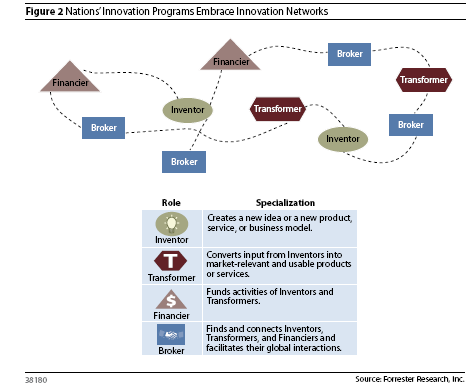The difference between innovation and invention

Developed nations spend $1,270 per capita per year to boost research and development and knowledge. But the returns are minimal.
That's the conclusion of a Forrester report on national innovation networks. The findings of the report, dated Dec. 12, was mentioned in an InformationWeek story March 5. However, as Mike at Techdirt notes the article misses a key issue: Part of the reason these national innovation networks stumble is that they confuse innovation with invention.
Mike's point can't be understated. If you invent something and don't do anything with it your efforts are wasted. Innovation (see BNET library on the topic) is taking that invention and moving the ball ahead to market it and extend the idea. For instance, Google didn't invent keyword text ads, but it did a lot with the model.
Since I've been on the horn with Forrester a good bit today (see the stab at the ROI of Daylight Saving Time) I got a copy of the report while I was at it.
In short, Forrester notes that governments around the world have put innovation high on their lists to create wealth, jobs, power, solutions to big problems and hope. These initiatives have stumbled because governments launch programs that are biased by designed, detached from reality and (to get to Mike's point) focused on inventions.
Forrester says:
Innovation indices confuse innovation with invention. The innovation value chain--in a national context-- encompasses the end-to-end cycle from R&D invention to its value realization in the society at large. As such, invention is only a subset of innovation that’s generally science-based research or focused on product design and results in patentable inventions. National employment, power, wealth, and well-being depend more on the deployment of innovations than on the invention itself.
So how do you fix this situation? Forrester recommends that nations stop thinking of innovation as a closed system (sort of a not invented here mentality) and open up to ditch protectionism, seek ideas to be deployed globally and partner with countries.
"Countries, like firms, can most easily reap the rewards of innovation through a global ecosystem in which firms, universities, NGOs, and governments collaborate. We call this an Innovation Network. Within such a network, nations will fluidly weave internally and externally available inventions and innovation services by taking on one of four innovation roles: Inventor, Transformer, Financier, or Broker."

Forrester recommends that nations take a page from the playbooks of IBM, Procter & Gamble and BT to name a few. These companies know the key roles in the innovation food chain.
For instance, "inventor nations" lead in research and design. These countries (think India 20 years from now) have the academic institutions and scientists to file a lot of patents. "Transformer nations" take those ideas and turn them into businesses with investment. "Financiers" bankroll the innovation with venture capital (think U.S.). "Broker nations" connect all of these pieces with "multiculturalism, workforce diversity, cross-border scientific collaboration, Internet adoption, language proficiency, foreign student rates, patents created with foreign co-inventors, and international venture capital funding."
Going from that description, the U.S. has some of all of those pieces today, but given the lack of science interest among students chances are we'll be financiers, transformers with the possibility of being a broker nation.
Or not. Forrester says there are limits to the number of roles that a nation can play. In its evaluation, no nation led in every category and most categories didn't have a clear cut leader. For instance, Ireland was a leader in the transformer role. In the other role, no nation was a leader. "With the top spots up for grabs, all other nations can benefit from focusing on the roles at which they perform best," says Forrester.
Developed nations max out at two roles. Says Forrester:
"The US and Switzerland are strong in both Inventor and Broker roles; Finland scores highly as an Inventor and Financier; the UK is good at Broker and Financier roles. We see similar dual-role strengths from Sweden, Denmark, the Netherlands, and France. The implication? Successful nations will seek multiple international relationships to complement their own strengths."
Upcoming nations need to do one thing really well first. There's a lot more to this report with details on methodology, wave rankings and recommendations for all of the countries mentioned. With any luck these countries will get the report. It'll be quite an eye opener to the politicos around the world trying to make their mark on innovation.